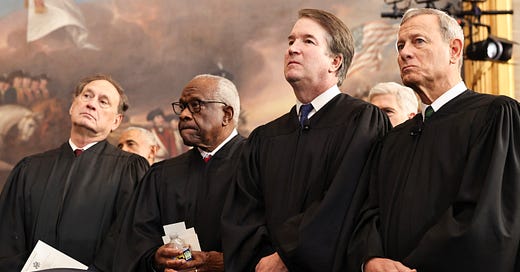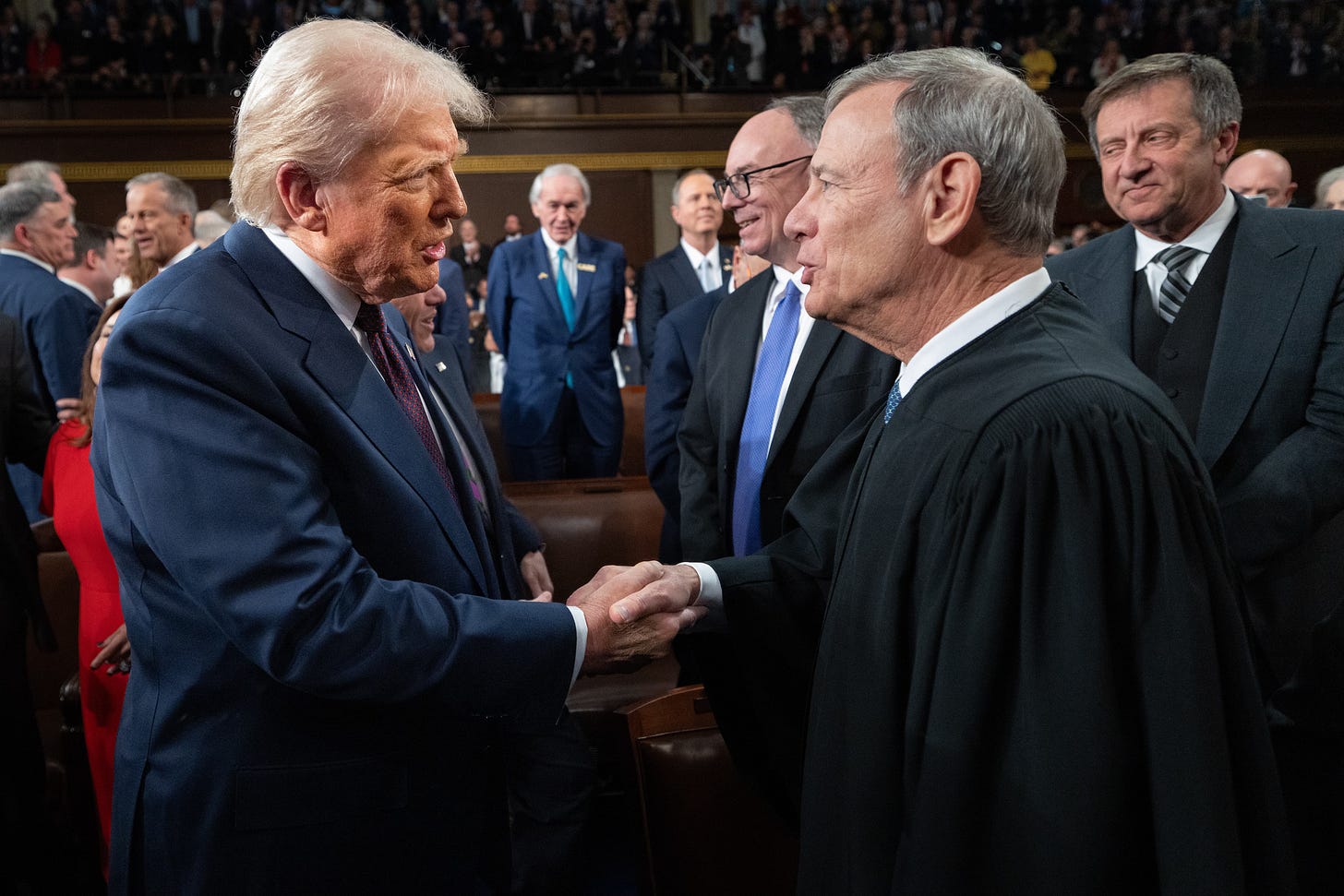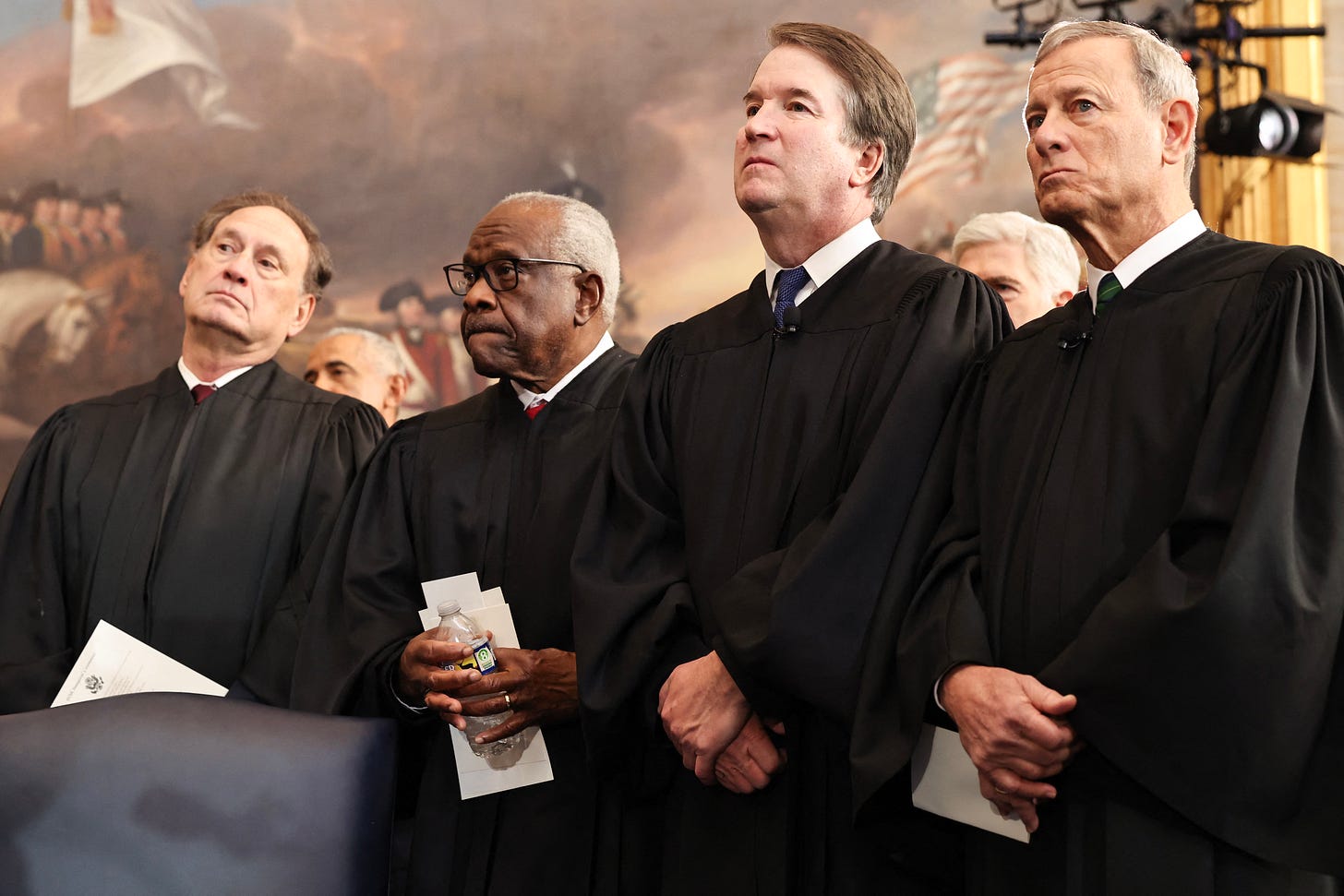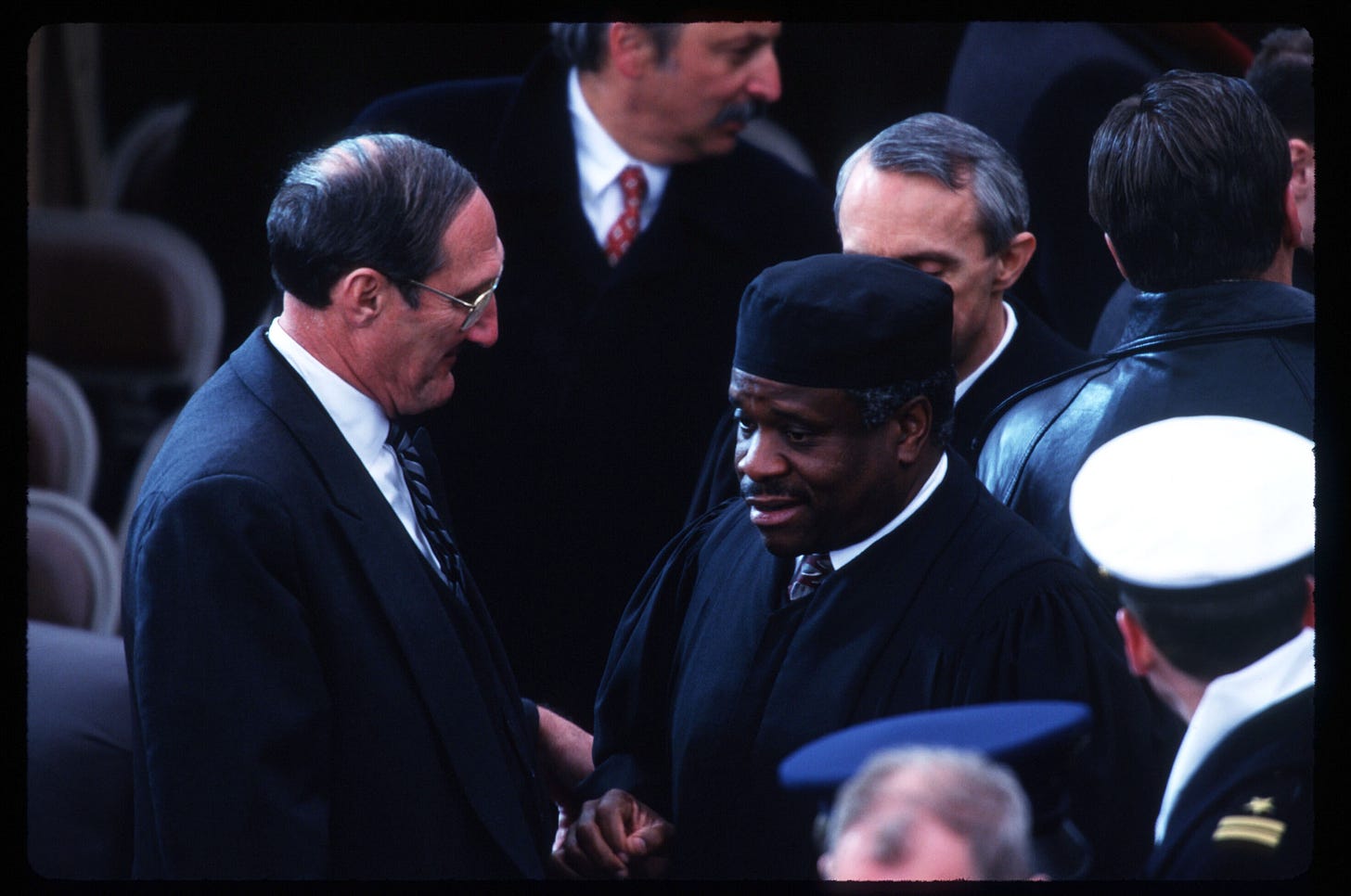The Supreme Court Really Expects You to Take This Craven Horseshit Seriously
The conservative justices looked at the most embarrassing line in Bush v. Gore and thought, "Yeah, let’s do that again."
In a shadow docket decision on Thursday, the Supreme Court’s six Republican justices gave their very favorite president yet another generous gift. In an unsigned opinion in Trump v. Wilcox, the Court allowed Donald Trump to fire two independent agency board members, despite the facts, as its opinion explicitly acknowledged, that (1) federal law prohibits presidents from firing them except for cause, and (2) Trump did not even attempt to provide one.
In Wilcox, the Court effectively ceded to Trump the power to overturn a century’s worth of its own precedent. As is so often the case when the Court does something this stupid and embarrassing, whoever wrote the opinion did not have the courage to put their name on it.
The case is a legal challenge brought by National Labor Relations Board member Gwynne Wilcox and Merit Systems Protection Board member Cathy Harris, two Biden appointees whom Trump attempted to fire earlier this year. Back in 1935, the Supreme Court in Humphrey’s Executor v. United States upheld Congress’s right to extend for-cause removal protections to officials like Wilcox and Harris, thus (somewhat) insulating them from political pressure. But the conservative justices have narrowed the scope of Humphrey’s Executor in recent years, carving out inventive exceptions to allow presidents to fire officials whom Congress sought to protect. The Trump administration has already said it wants the Court to get rid of Humphrey’s Executor altogether; on Thursday, the Court granted his wish.
The Wilcox majority would not agree with this characterization. They would say that their decision merely gets rid of a lower court order that had temporarily blocked Trump from firing Wilcox and Harris while their cases wind their way through the court system. The justices in the majority acknowledged that they are “likely” to side with the Trump administration once the case arrives on their regular docket. But, they continued, that question is “better left for resolution after full briefing and argument.”
This is, to use the legal terms of art, both dogshit reasoning and a horseshit conclusion. “Staying” an order that blocked a termination is nonsensical, because the effect of this decision is that Wilcox and Harris are, in fact, fired. The majority’s assertion that it did not “ultimately decide” the case is sort of like telling your significant other that you have decided to move out because you are “thinking about” breaking up: If you are using that language and taking these actions, it’s a wrap, regardless of whether you have managed to spit out the words just yet.
And as Justice Elena Kagan pointed out in a dissent that the two other liberals joined, by stating that they are “likely” to buy the Trump administration’s arguments, the justices have already signaled their intention to make this temporary conclusion permanent—an oafishly unsubtle preview of the policy choice to come. It is the same sleight-of-hand the Court pulled in 2021 when it allowed a de facto abortion ban to take effect in Texas: The fact that the justices hadn’t technically overruled Roe was not helpful to people who could no longer access abortion care as a result.
The majority goes on to frame its decision to let Trump fire Wilcox and Harris as the prudent course of action, calling a stay of the lower court order necessary “to avoid the disruptive effect of the repeated removal and reinstatement of officers during litigation.” But the effect of the most recent lower court order was to preserve the status quo, keeping Wilcox and Harris in their positions for the time being. This means that the decision triggers a fresh round of the same “disruption” the Court purports to want to avoid—a result that only makes sense if, again, the conservative justices already have a shared Google Doc outlining next term’s opinion that will finally, formally fire them for good.
For the conservatives, engineering this result has only one flaw, but it is a big one: Allowing Trump to fire Wilcox and Harris would necessarily allow him to fire Federal Reserve Board Chair Jay Powell, which the president has long expressed his desire to do. Thus, to try and prevent Trump from replacing Powell with a Fox Business dipshit who changes interest rates by the hour, the Court appended a paragraph to its opinion asserting, no, he can’t do that: The Fed, the conservatives wrote, is a “uniquely structured, quasi-private entity” borne of the “distinct historical tradition” of Founding-era national banks. The majority does not explain why, or cite legal authority to support the distinction they are trying to draw. They are only offering a bare conclusion: Wilcox and Harris are out, but the global economy remains safe.
To call this hackish is insulting to hacks; to call it unprincipled is insulting to Marco Rubio’s career in politics. Law is, in theory, a system of consistent rules applied to generate fair, predictable outcomes. This was the entire point of Roberts’s “balls and strikes” speech two decades ago: Judges are not supposed to apply a rule when it lets a president replace pro-worker agency heads with union-busting reactionaries, but not when it lets him tank their investment portfolios. Judges are really, really not supposed to do this when, as the justices in the majority insisted, they are not deciding anything on the merits, because they would never dare answer such weighty questions of law without “full briefing and argument.”
The result in Wilcox is exactly the sort of stunt that conservative legal movement types bitching about “judicial activists” purport to abhor: The justices decided on their preferred policy outcome, and instead of grappling with the consequences, they wave them away without bothering to attempt a coherent explanation. This is what happens when Sam Alito’s dogmatic vitriol for administrative agencies clashes with his burning passion for doing the Chamber of Commerce’s bidding. It is the 2025 version of the infamous line in Bush v. Gore that purported to limit the decision to the “present circumstances,” but for Republican parents who are getting ready to send another kid to Vanderbilt next year, and really cannot afford to take a hit.
In her dissent, Kagan noted that this case is not about allowing Wilcox and Harris to keep their jobs—it is about the harm of denying the public the benefit of allowing them to work, as Congress intended, while “protected from a President’s desire to substitute his political allies.” But the conservative justices have wanted to empower presidents in this way for a long time. What’s the fun in waiting any longer to do it?
As always, you can find everything we publish at ballsandstrikes.org, or follow us on Bluesky at @ballsandstrikes.org. You can get in touch by emailing us at contact@ballsandstrikes.org. Thanks for reading.
This Week In Balls & Strikes
This Provision In the House Budget Bill Would (Further) Empower Trump’s Lawbreaking, Madiba Dennie
Courts use contempt findings to enforce their orders. House Republicans do not want to give them that option.
James Ho Understands What Trump Wants In a Supreme Court Justice, Jay Willis
Getting on this White House’s Supreme Court shortlist is a matter of showing that you will be loyal to the president above all else.
It Is Hard to Overstate How Wrong Kristi Noem Is About Habeas Corpus, Madiba Dennie
The Trump administration is attempting some ambitious reinterpretations of the Constitution to justify its anti-immigrant agenda.
Four Simple Reasons Why Trump Should Lose the Birthright Citizenship Case, and Badly, Madiba Dennie
Trump v. CASA is not complicated, if you take the law at its word.
This Week In Other Stuff We Appreciated
Matt Kacsmaryk Shouldn’t Be a Judge, Chris Geidner, Law Dork
“He doesn't want to be a judge. He wants to run a right-wing advocacy group.”
What It Would Look Like If the Trump Admin Got Its Way In the Birthright Citizenship Case, Shirin Ali, Slate
“As a nation, we haven’t had citizenship turn on crossing states since the Civil War, and it’s not clear how this would work on the ground at all.”







Substantive due process reduces to procedural due process. Once the nomination process (beginning with the ongoing/background rot of the Electoral Clg) to the federal judiciary is corrupted, the substantive nightmares are predictable as flies on shit. Gorsuch was nominated according to an obscure rule (Purcell), originally intended for the ballot-box alone, that was later discarded in order to seat Catholic Disneyland's ACB during the Presidential election itself. The ringleader for this robe theft is, of course, our Chief Justice, who once discarded African American ballots at more than ten times the rate of Caucasian ballots on behalf of the idiot son of an Iran Contra war-criminal. Shelby later discarded preclearance for the entire Confederacy, not just Florida. Husted scrubs Ohioans off the voting rolls for skipping an election, thereby reversing the burden of proof for ballot eligibility from government to governed. John Roberts, Jim Crow for the new century, always assigns the majority opinion in ballot-destruction cases to himself.
Clarence Thomas carries porn mags underneath his robe. Sam Alito is mean as a yard dog. Brett Kavanaugh is an intoxicated rapist whose $200K bar tab at Nationals Park was paid off by an enabling parent. Unelected, for life, remains a corruption two-fer. The most dangerous man in America ain't Chump. Why, that ain't a gavel in the hand of Jim Crow, metaphorically speaking: It's the bony finger of Death, exiting the sleeve of his black robe and pointed directly at you and me.
"I thought Brett was going to kill me." --Christine Blasey Ford
In the second paragraph of its decision, the majority writes that it has “balanced” the risk of harm to the government (by allowing an officer to continue exercising authority) against harm to the individual officer (by being denied continued service in performance of their duties). Not one word about the interests of the public at large or the class of people whose interests are at stake. Specifically, crickets about the people that agencies like the NLRB and MSPB were created to protect. Would the Justices explain their omission by saying that the interests of the people and the interests of the government are the same? Even interchangeable, for purposes of this balancing test? There was a time when a claim to that equivalency might have flown. But in this term and in his previous term, the president has demonstrated that the single interest his government serves is the ascendency of his personal power. Any other interest is disloyalty, and disloyalty is cause enough to tip the "balancing" of harms that so concerned the majority.